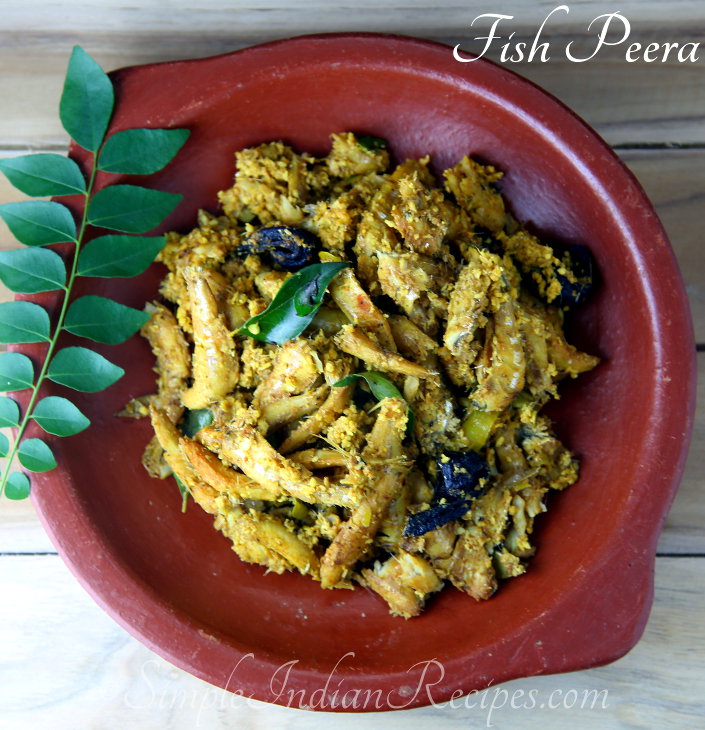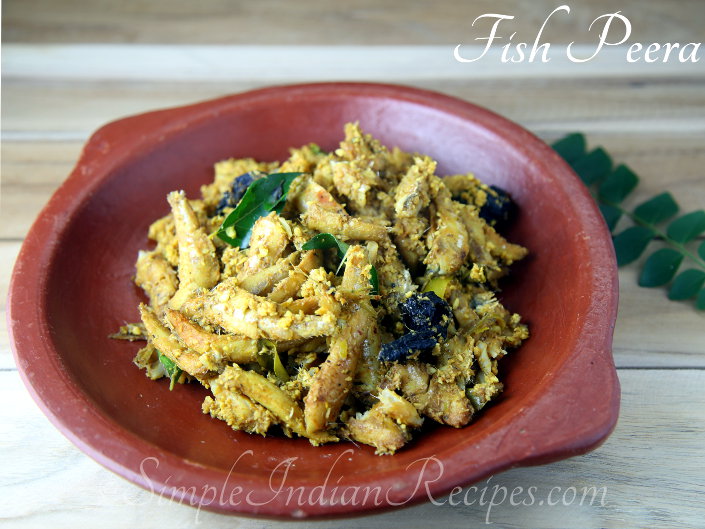- Submitted by Dahlia
(Podi Meen Thoran, Meen Pattichathu, Fish Thoran, Meen Vattichathu, Meen Kootu, Netholi Peera, Small Fish Coconut Stir Fry)

Jump to recipe ↓
Fish Peera is a traditional dish made in Kerala with tiny fishes. The preparation is very similar to making thoran. Most commonly fish peera is made with netholi, also called kozhuva or chooda or anchovies. However, any small variety of fish can be used. The smaller the fish, the dish tastes better. If you are living abroad and cannot find fresh anchovies, you can try it with canned or frozen fish. The taste will surely not be the same.
It is a very delicious dish that tastes much better than how it looks. The taste of grated coconut and the tiny fishes blends very well. I have taken about 1.5 cups of coconut for 1/2 kg of fish. You can reduce or increase this amount. Since it is a Kerala dish, the more coconut you add the better it tastes.
Talking about the procedure, I have mentioned to coarsely grind the ingredients. I had a maid at home who would pound the ingredients except coconut using a mortar and pestle. She would just add the grated coconut as such. Then she would massage the fish with the pounded masala and the coconut. According to her this gives the best results. Most Malayalees would drool over a plate of steamed red rice and some meen peera.
Recipe for Meen Peera
Preparation time: 15 minutes
Cooking time: 20 minutes
Serves: 4-6
Ingredients
- Anchovies fish (Netholi) - 1/2 kg (about 1 lb) (Even small sardines or mathi can be used)
- Small Onions - 10-12
- Green Chilies - 6
- Garlic - 10 cloves
- Ginger - 1" piece
- Gambooge (Kokum or Kodum Puli) - 3
- Grated Coconut - 1.5 cup
- Turmeric Powder - 1/2 tsp
- Coconut Oil - 2 tbsp
- Curry Leaves - 2 sprigs
- Salt - to taste
- Water - 1/4 cup
Method
- Clean the fish thoroughly at least 8-10 times until the fishy smell is gone and the water runs clear. Usually anchovies are scrubbed with rock salt to remove the silver coating. Keep it ready.
- Wash and soak the kodum puli (gambooge) in 1/4 cup of water for about 10 minutes. If you do not have kokum, you can use regular tamarind or raw mango pieces or lemon juice.
- Take the grated coconut, shallots, garlic, ginger, green chilies, few curry leaves and turmeric powder in the small jar of the mixie. Grind it coarsely without adding any water.
- Take the cleaned fish, ground coconut paste, soaked kudam puli along with the water and required salt in a clay pot or any wide pan. Authentic Kerala preparations use the earthen clay pot, known as the meen chatti.
- Some people also like to add a spoon of red chili powder. Mix it gently using your hands or a spoon and switch on the flame.
- Cook on low flame throughout to prevent it from getting burnt at the bottom. Cover with a lid and cook for about 12-15 minutes. In case you want to mix in between, do it very gently just once without breaking the fishes.
- By now the fish will be cooked. Open the lid and continue cooking for another 3-5 minutes so that all the moisture evaporates.
- After the dish dries up, drizzle the coconut oil on top. Add some fresh curry leaves and switch off.
- Keep the pot covered until you are ready to serve.
Serving Meen Peera

Variation
- During mango season, a few pieces of raw mangoes can be added instead of the kodum puli. I love this variation too.
More Fish Recipes